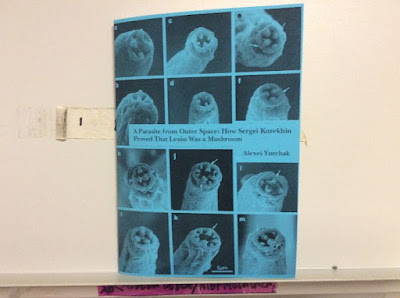A Parasite from Outer Space: How Sergei Kurekhin Proved That Lenin Was a Mushroom
alexei yurchak (2011)
alexei yurchak (2011)
(Kurekhin) infiltrated the
system’s internal structure like a parasite, faithfully reproducing the forms
of its political rhetoric (..) and,
in so doing, presented the absurd core of this system that its own reforms
had inadvertently unclothed. In truth, the authentic, uncorrupted foundation
of the Soviet system, to which the party claimed it was necessary to return,
could not really be known and was, therefore, open to any interpretation,
including the interpretation that it had been a mushroom.(..)
What I do is something different—it is a form
of parasitising on an existing archetype. This is precisely what I do—
parasitising. I am a parasite. And also a bastard, a cretin, and a piece of
shit.” These last words were added with a chuckle, to distance himself
from didactic seriousness, but his analysis was anything but a joke. Kure-
khin added: “I would like to introduce the word parasite as a new term.”
Indeed, this term proves remarkably precise in describing the politics
of his aesthetic method. Kurekhin explained: “A parasite is ambivalent.
Being a parasite vis-à-vis a system means, on the one hand, possessing a
structure that is completely independent of the system, but, on the other
hand, being part of the system, feeding off it. . . . Parasitizing is like looking
deep into things—not negating, ridiculing, or judging them, but mak-
ing visible their internal criteria.” Kurekhin suggested that the relation
of the parasite to the organism, or system, that it inhabits goes beyond
the binary opposition between being a part of something and being an
external intruder. Instead, their relationship is symbiotic: the parasite
forces the system to change in order to accommodate or expel it.
system’s internal structure like a parasite, faithfully reproducing the forms
of its political rhetoric (..) and,
in so doing, presented the absurd core of this system that its own reforms
had inadvertently unclothed. In truth, the authentic, uncorrupted foundation
of the Soviet system, to which the party claimed it was necessary to return,
could not really be known and was, therefore, open to any interpretation,
including the interpretation that it had been a mushroom.(..)
What I do is something different—it is a form
of parasitising on an existing archetype. This is precisely what I do—
parasitising. I am a parasite. And also a bastard, a cretin, and a piece of
shit.” These last words were added with a chuckle, to distance himself
from didactic seriousness, but his analysis was anything but a joke. Kure-
khin added: “I would like to introduce the word parasite as a new term.”
Indeed, this term proves remarkably precise in describing the politics
of his aesthetic method. Kurekhin explained: “A parasite is ambivalent.
Being a parasite vis-à-vis a system means, on the one hand, possessing a
structure that is completely independent of the system, but, on the other
hand, being part of the system, feeding off it. . . . Parasitizing is like looking
deep into things—not negating, ridiculing, or judging them, but mak-
ing visible their internal criteria.” Kurekhin suggested that the relation
of the parasite to the organism, or system, that it inhabits goes beyond
the binary opposition between being a part of something and being an
external intruder. Instead, their relationship is symbiotic: the parasite
forces the system to change in order to accommodate or expel it.
